Diversity





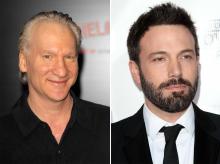
Rene Girard has a prophetic warning in his book Battling to the End about the West’s fight against Islamic jihadists:
The West is going to exhaust itself in its fight against Islamic terrorism, which Western arrogance has undeniably kindled.
That Western arrogance was on display last weekend on Real Time with Bill Maher. The tense debate about Islam between Bill Maher, Sam Harris, and Ben Affleck has been shared multiple times over social media and provides a case study in Girard’s mimetic theory.
One element that mimetic theory illuminates in this discussion of Islam is the scapegoat mechanism. Scapegoating is a non-conscious way of reinforcing a group’s relationship by blaming another group of people for our problems. The scapegoating mechanism is non-conscious because we always think that we are innocent and that our scapegoats are guilty. The video below shows a great example of the scapegoating mechanism when it comes to Islam. (Warning: It's an HBO show — there is some foul language.)


In some ways, the case of the Muslim prisoner who wants to grow a beard seems easy. When it comes to a prisoner’s religious rights, federal laws favors accommodation when possible.
So how could Gregory Holt — known as Abdul Maalik Muhammad after his conversion to Islam — possibly lose at the Supreme Court, where the justices heard his case on Oct. 7?
Holt wants to grow a mere half-inch beard — a length of whisker allowed in the vast majority of state prison systems, but not the one where he is incarcerated: Arkansas.
Even Chief Justice John Roberts wondered how such a seemingly straightforward case came before the high court, which usually occupies itself with the thorniest of legal questions.
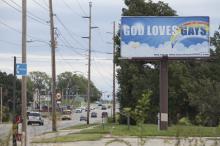
As small bands of protesters from Westboro Baptist Church take their trademark “God Hates Fags” signs to demonstrations outside funerals, concerts, and schools across the country, a new message has come to their Topeka, Kan., headquarters: “God loves gays.”
The God Loves Gays Billboard Project launched Aug. 9 on the crowdfunding site Indiegogo, aiming to raise $50,000 to put up a sign about three miles from the church. Organizers hoped to reach the goal by Oct. 8 but surpassed it about a month and a half early.
On Oct. 6, the campaign reached $100,000, two days after the announcement that there is space for another billboard, this one in Salt Lake City, the heart of Mormon country.
The project shows the power of harnessing online media — in this case, a crowdfunding site such as Indiegogo — to push back against religious hate speech from a reviled source.
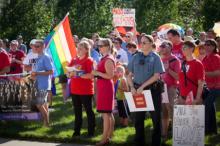
The Supreme Court’s decision to sit out the legal battle over same-sex marriage will — for now, at least — leave the future of laws prohibiting gays and lesbians from marrying in the hands of lower state and federal court judges. But it also almost certainly means the couples challenging those laws are more likely to win in the end.
The court said Oct. 6 that it would not hear appeals from five states whose same-sex marriage bans had been invalidated by lower federal courts. The decision, issued without explanation, will likely lead to recognition of gay marriages in 11 more states. It also allows an avalanche of legal challenges to the remaining bans to keep going forward in state and federal courts, where gay and lesbian couples have overwhelmingly prevailed.
The court’s decision leaves unchanged 20 state laws blocking same-sex unions. Each is already under legal attack, facing challenges in state or federal court, and sometimes both. Challenges to marriage bans already have reached a handful of state appeals courts and the federal appeals courts for the 5th, 6th, 9th and 11th circuits.
Some of those judges had been waiting to see what the Supreme Court would do. The court’s instruction Oct 6. was: Proceed.
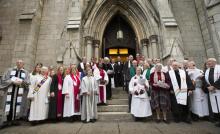
United Methodists in Pennsylvania have agreed to resolve a complaint filed against three dozen clergy who blessed a gay wedding without taking the case to trial.
A complaint was filed against 36 United Methodist pastors who officiated at a Nov. 9, 2013 wedding for two men at Arch Street United Methodist Church in Philadelphia. On Oct. 3, Philadelphia Area Bishop Peggy Johnson announced that the complaint had been resolved.
The resolution calls for the officiating clergy to acknowledge that they violated rules of the United Methodist Book of Discipline, which includes the denomination’s constitution. In return, the complaint will be withdrawn.
“Though I may sympathize with the pastoral concerns of the respondents, it is unacceptable to disregard and disobey the Book of Discipline,” Johnson said. “I pledge that, in future cases where clergy within my jurisdiction officiate or host a same-gender ceremony, any complaints that I receive will be handled swiftly and with significant and appropriate consequences, which may include a trial, involuntary leave of absence without pay, or other significant consequences, in accordance with the Discipline and in consultation with the Board of Ordained ministry and the clergy session of the annual conference.”
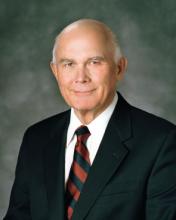
If Mormon opposition to same-sex marriage does not prevail in the United States, Mormons should respond graciously and “practice civility with our adversaries,” a leading church apostle counseled Oct. 4 at the faith’s General Conference.
“We should be persons of goodwill toward all,” said declined to hear appeals from five states, including Utah, in which federal appeals courts had struck down bans against gay marriage. Within hours, clerks across Utah, Virginia, Indiana, Wisconsin and Oklahoma began issuing marriage certificates to gay and lesbian couples.
Oaks, who has been outspoken in defending Mormons’ stance against gay marriage, said those in the 15 million-member Church of Jesus Christ of Latter-day Saints should be exemplars of civility.
“We should love all people, be good listeners, and show concern for their sincere beliefs,” he said during the afternoon session of the 184th Semiannual LDS General Conference, a two-day meeting broadcast across the world via satellite, TV or the Internet. “Though we may disagree, we should not be disagreeable. Our stands and communications on controversial topics should not be contentious.”
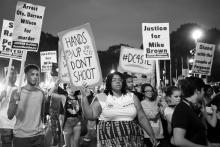
ON AUG. 9, Michael Brown, an unarmed black teenager, was shot to death by Ferguson, Mo., police officer Darren Wilson. A collective groan was let out across social networks—people began the lament “Not again.”
Just four days prior, John Crawford III, a 21-year-old black man, had been gunned down by police in a Walmart in suburban Dayton, Ohio, without warning, while shopping for a BB gun. A few weeks earlier, Eric Garner, an African-American man, was choked to death by a New York City police officer.
For young black men, each incident is a reminder of how easily our lives can be taken away by police aggression. For the people in Ferguson, however, over-policing is all too familiar. In a city where 67 percent of the residents are black, there are only three black police officers on a force of 53.
A 2013 report from the Missouri attorney general’s office revealed just how bad relations are between officers and black citizens. Out of the 5,384 traffic stops made last year by the Ferguson Police Department, 86 percent of them targeted black drivers. Black drivers were searched and arrested at nearly twice the rate of white drivers, although contraband was found at a rate 13 percent less than that of white drivers.
MULTIRACIAL CHURCHES are becoming more common in this country—but that doesn’t happen by chance.
A 2010 study by the Hartford Institute for Religion Research, based on a random sample of more than 11,000 congregations, revealed an increase in multiracial congregations in the U.S.—30 percent of churches reported that more than half of their members were part of minority groups.
Members of three multiracial churches in and near the nation’s capital—one Catholic, one Methodist, and one nondenominational—say that at their church “people don’t look the same, or think that much about it,” and describe their congregations as welcoming places “where you can feel God’s presence, where you can be yourself.”
Though Sunday worship time is still known as “the most segregated hour in America,” older members of churches such as Peace Fellowship Church in Washington, D.C., St. Camillus Catholic Church in Silver Spring, Md., and Culmore United Methodist Church in Falls Church, Va., remember when things started changing. As migration and demographic shifts altered neighborhoods and communities, members sought to engage in “desegregated” worship, opting to join communities that mirrored a world with different cultures and ways to praise God.
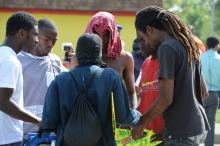
If, as many of the religions of the world affirm, there is a profound equality of dignity and worth between all human beings by virtue of their humanity alone, then what are we to make of a nation and its citizens who allow an entire group of people, a people once brutally enslaved and still actively oppressed, to continue to be stigmatized in ways that implicitly affirm their inferiority as a group and so allow too many of them to experience the devastating consequences of entrenched racial inequality? That nation and its citizens would stand accused of the greatest of injustices. That nation and its citizens would have a divine duty to end that injustice. The United States and we its citizens stand so accused today. Until we understand the imperative to eliminate racial inequality as an obligation grounded in ultimate reality, we will fail to understand the magnitude of our responsibility.
Whether the issue is wealth, health, incarceration, employment, or education, blacks as a group experience significantly disproportionate negative outcomes compared to whites. What accounts for this difference? Only two options are available. Significant racial inequality over time is explained either by forces external to the lives of black individuals (e.g., economic, legal, and social forces), or by the aggregate consequences of choices made by these individuals. Unless one concludes that racial inequality is entirely explained by forces external to the lives of black people, one is forced to conclude that there is something inferior about blacks as a group that causes them persistently to make more bad life choices than whites as a group.
At this point, some will object that some black people do indeed make bad choices that lead to bad outcomes. But so do some white people. The question is what accounts for the differences in the proportion of bad outcomes?

A Chicago woman has launched an online petition asking El Al Airlines to allot a section of its planes to ultra-Orthodox Jewish men who do not want to sit next to women.
Sharon Shapiro initiated the petition on Sept. 28, after two instances when several ultra-Orthodox men flying on Israel’s national carrier refused to sit in their assigned seats, which adjoined a seat occupied by a woman. The flights were delayed after female passengers refused to relinquish their assigned seats and the ultra-Orthodox men refused to sit down.
Incidents like these have been going on for years, according to women’s rights advocates.
Gender segregation is a core precept in ultra-Orthodox society, which believes that contact between unrelated men and women is strictly forbidden by Jewish law.
In Israel, attempts by some ultra-Orthodox men to impose gender segregation in public spaces such as offices, public buses and even streets in certain neighborhoods have prompted legal action by groups opposed to what they view as religious coercion.
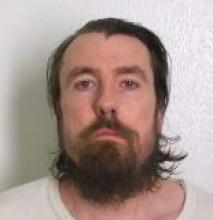
It’s not every day that a coalition of legal minds is rooting for a violent inmate convicted of stabbing his girlfriend in the neck.
When Gregory Holt’s case arrives at the U.S. Supreme Court on Oct. 7, lawyers won’t be arguing about what landed him a life sentence in an Arkansas state prison, but rather what he wanted to do once he got there: grow a beard in observance of his Muslim religious beliefs.
The state of Arkansas says he can’t. Holt — a convert to Islam who now calls himself Abdul Maalik Muhammad — says he would keep his beard no longer than half an inch. But prison officials, backed by the state’s attorney general, argue that even such a short beard poses security risks.
“When it comes to making prison policies, the stakes are high; lives can be lost if the wrong decision is made,” according to the state’s legal brief, which describes Holt as a violent self-declared fundamentalist. “The ADC takes religious freedom seriously, but it takes seriously its paramount interests in safety and security, too.”
The St. Louis-based 8th U.S. Circuit Court of Appeals agreed with Ray Hobbs, the director of the Arkansas Department of Correction. But it’s hard to find too many others who think that the prison’s case for security trumps Holt’s right to exercise his religion.
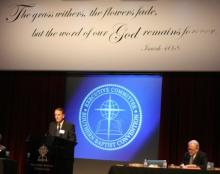
The Southern Baptist Convention’s Executive Committee voted unanimously Sept. 23 to break ties with New Heart Community Church in La Mirada, Calif., after determining it was condoning “homosexual behavior.”
“We believe that, following the lead of Pastor Danny Cortez, New Heart Community Church has walked away from the Southern Baptist Convention’s core biblical values,” said Roger Oldham, a spokesman for the committee.
Oldham said Cortez attended the meeting and indicated that he had officiated at a same-sex wedding.
The denomination has cut ties to churches that endorsed homosexuality before, but this may be the first time that its Executive Committee has withdrawn fellowship from a church on behalf of the denomination. The move came less than two weeks after the California Southern Baptist Convention’s Executive Board voted unanimously to withdraw fellowship from the congregation because of Cortez’s announcement that he affirmed gays — including his teenage son — and his church had taken a “third way” on homosexuality.
A new coalition of atheists, humanists and other nonreligious groups is taking a page from the gay rights movement and encouraging people to admit they are “openly secular.”
The coalition — unprecedented in its scope — is broadening a trend of reaching out to religious people and religious groups by making the secular label a catchall for people who are not religious.
“We wanted to rise above who is an atheist, who is an agnostic, who is a humanist, who is a secular Jew,” said Todd Stiefel, founder of the Stiefel Freethought Foundation and a main force behind the coalition. “This needed to be about something everyone could rally behind so we intentionally used the word secular because it was one thing we could all agree on.”
The campaign, “Openly Secular: Opening Minds, Changing Hearts,” was unveiled at the 65th annual gathering of the Religion Newswriters Association here on Sept. 20. It includes a website, resources for families, employers and clergy, and a YouTube channel featuring both prominent and rank-and-file nonbelievers announcing their names followed by the declaration, “I am openly secular.”
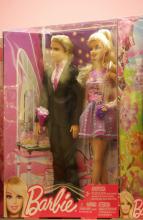
Barbie has had a number of careers in her 55 years — flight attendant, veterinarian, astronaut, even president. Her latest role, however, is raising eyebrows.
Italy’s Catholic bishops are furious about controversial artistic depictions of the popular Barbie and Ken dolls as the Virgin Mary and a crucified Jesus Christ and other saints.
Two Argentinian artists, Marianela Perelli and Pool Paolini, produced 33 dolls of various religious figures for a show named “Barbie, The Plastic Religion,” which opens in Buenos Aires on Oct. 11.
SIR, an Italian website backed by the Italian bishops conference, denounced the controversial toys in an editorial, which asks: ” What is the difference between provocation and bad taste?”